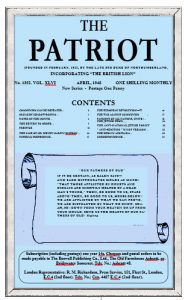COMMUNISM CAN BE DEFEATED
IN the summer of 1937 the Swiss people took a vote on the subject of passing a law to proclaim as illegal ” the associations and organisations affiliated directly or indirectly with the Communist International.” It may be added that the Swiss Constitution bars citizens of a Foreign Power from exercising political rights in the country and, under the new proposal, those affiliated with the Communist International were to be deprived of political rights. It was pointed out then in these columns, nearly 11 years ago, that it was time this country adopted some such steps as those taken in Switzerland against the agents of the Soviet Government.
Switzerland, of course, had had ample reason for taking steps, Canton by Canton, against the Communists, for Lenin, Trotsky, and many other refugees, had abused Swiss hospitality. The Soviet representative at Berne in November, 1918, was found to have been behind the general strike engineered at that time, and the long spell of disorders was traced to Communist activities. As a result, the Swiss authorities broke off relations with Soviet Russia, and in 1937 the Cantons of Neufchatel and Geneva prohibited Communism.
In the campaign for the interdiction of Communism a Genevan advocate, M. Eugene Gaulis, played a prominent part and issued a sheet on “The Communist Programme,” which contained the following as given in THE PATRIOT of December 16, 1937:
“Experience has proved that in all countries where the Communist Party has tried to seize power by provoking bloody disorders, it was composed only of a small number of members, and notwithstanding that constituted a formidable power of revolution and destruction. In Spain, at the 1936 elections, the Communist Party only elected 16 Deputies out of 470 in Parliament. In France the ‘Front Populaire’ Government (the lucky-find of Dimitroff, general secretary of the Communist International) is prisoner of the Communists, who have only 72 Deputies out of more than 600 in the Chamber. Revolutions, history proves, have always been made by disciplined minorities.
